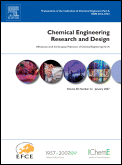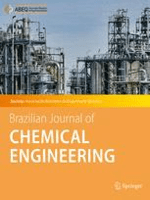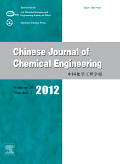
Chemical Engineering Journal Advances
Scope & Guideline
Innovating Tomorrow's Solutions in Chemical Engineering Today.
Introduction
Aims and Scopes
- Chemical Process Engineering:
Research that innovates and optimizes chemical processes, including reactor design, separation processes, and thermodynamic modeling. - Materials Science and Nanotechnology:
Studies involving the synthesis, characterization, and application of nanomaterials and advanced materials in chemical engineering contexts. - Environmental Engineering and Sustainability:
Research focused on the treatment of waste and pollution, resource recovery, and sustainable practices in chemical engineering. - Catalysis and Reaction Engineering:
Innovative approaches to catalysis, including development of new catalysts and reaction mechanisms for enhanced efficiency in chemical reactions. - Computational Modeling and Simulation:
Application of computational techniques to model and simulate chemical processes, aiding in the understanding and optimization of complex systems. - Biochemical Engineering:
Exploration of bioprocesses, including biofuel production, bioremediation, and the use of biological systems in chemical engineering applications.
Trending and Emerging
- Sustainable and Green Chemistry:
A marked increase in research focusing on sustainable practices, including green synthesis methods, waste-to-resource technologies, and environmentally benign chemical processes. - Nanotechnology in Chemical Engineering:
Emerging themes around the application of nanomaterials in catalysis, water treatment, and energy storage are gaining traction, showcasing the potential of nanoscale innovations. - Advanced Water Treatment Technologies:
There is a growing emphasis on innovative water treatment solutions, including electrochemical processes, photocatalysis, and bioremediation techniques aimed at addressing emerging contaminants. - Biotechnology and Bioprocess Engineering:
An increasing number of studies are examining the integration of biotechnology in chemical engineering, focusing on biofuels, biopolymers, and microbial processes for sustainable production. - Machine Learning and AI in Chemical Engineering:
The application of machine learning and artificial intelligence in modeling, process optimization, and predictive analytics is emerging as a critical area of interest, reflecting the digital transformation within the field.
Declining or Waning
- Traditional Chemical Engineering Processes:
There appears to be a waning interest in conventional chemical engineering processes that do not incorporate advanced technologies or sustainable practices, as researchers increasingly focus on innovative and green alternatives. - Heavy Industry Applications:
Research related to heavy industrial applications, such as those focused solely on fossil fuel processes, has become less prevalent, possibly due to a broader shift towards sustainability and renewable energy solutions. - Basic Theoretical Studies:
There is a noticeable decrease in purely theoretical papers that do not have practical applications or experimental validation, as the field moves towards more applied research.
Similar Journals

INDIAN JOURNAL OF ENGINEERING AND MATERIALS SCIENCES
Advancing the Frontiers of Engineering and Materials ScienceThe Indian Journal of Engineering and Materials Sciences is a pivotal publication within the engineering and materials science realms, focusing on fostering innovative research and knowledge dissemination in these dynamic fields. Published by the renowned National Institute of Science Communication (NISCAIR), this journal plays a critical role in bridging the gap between academic research and practical application. With its impact reflected in a Q2 ranking in Engineering and a Q3 ranking in Materials Science for 2023, the journal positions itself as a significant contributor to the discourse surrounding engineering advancements and material innovations. Since its inception in 1994, it has been a platform for researchers, professionals, and students, enhancing their ability to access high-quality research outputs. The journal is committed to providing open access to its valuable content, ensuring that knowledge remains universally accessible. As the field continues to evolve, the Indian Journal of Engineering and Materials Sciences remains a vital resource for those aiming to stay at the forefront of research and development.

Hemijska Industrija
Advancing Chemical Knowledge for a Sustainable FutureHemijska Industrija, an esteemed journal published by the Association of Chemical Engineers of Serbia, serves as a critical platform for advancing knowledge in the fields of chemical engineering and chemistry since its inception in 1989. With an Open Access policy adopted in 2017, the journal provides global access to cutting-edge research and innovative findings, enhancing visibility for authors and fostering collaboration among researchers, professionals, and students alike. This peer-reviewed journal currently holds a Q3 ranking in both Chemical Engineering (miscellaneous) and Chemistry (miscellaneous) categories, signifying its growing impact in these fields. Published in Belgrade, Serbia, Hemijska Industrija not only disseminates high-quality articles from various disciplines within chemical science but also emphasizes interdisciplinary approaches and practical applications, making it an invaluable resource for anyone seeking to stay at the forefront of chemical innovations.

Izvestiya Vysshikh Uchebnykh Zavedenii Khimiya i Khimicheskaya Tekhnologiya
Elevating Standards in Chemical Engineering ScholarshipIzvestiya Vysshikh Uchebnykh Zavedenii Khimiya i Khimicheskaya Tekhnologiya is a prominent academic journal dedicated to the fields of chemistry and chemical technology, published by the esteemed IVANOVSKOGO KHIMIKO-TEKHNOLOGI TSHESKOGO INST in the Russian Federation. With an ISSN of 0579-2991 and E-ISSN of 2500-3070, this journal has been a crucial platform since its inception in 1980, showcasing significant advancements and research findings, particularly in its converged periods from 1980, 1982, and 2017 to 2024. The journal is ranked Q3 in Chemical Engineering and Chemistry, reflecting its dedication to quality scholarship. Although open access options are currently unavailable, the journal plays a vital role in disseminating knowledge and fostering collaboration among researchers, professionals, and students in these critical scientific domains. Situated in Ivanovo, Russia, it continues to be a focal point for impactful research, making it an essential resource for those aiming to stay at the forefront of innovation in chemistry and chemical engineering.

Korean Chemical Engineering Research
Navigating the Landscape of Chemical Engineering ResearchKorean Chemical Engineering Research, published by the Korean Institute of Chemical Engineers, serves as a vital resource for those engaged in the expansive field of chemical engineering. With an ISSN of 0304-128X and an E-ISSN of 2233-9558, the journal offers a platform for scholarly articles that cover various aspects of chemical processes, innovative technologies, and sustainability practices in engineering. Despite being in the Q4 category of chemical engineering journals as per the 2023 rankings, the journal's focus on emerging research from South Korea and beyond presents unique insights valuable to professionals, researchers, and students alike. Operating under effective citation metrics, it finds its place within Scopus, ranking at 229 out of 273, indicating a niche yet specialized contribution to the broader scientific community. We invite you to explore this integral journal, which is committed to fostering discourse and development in chemical engineering through its extensive archive, dating back to 2014 and continuing to evolve through 2023.

CHEMICAL ENGINEERING RESEARCH & DESIGN
Bridging Theory and Practice in Chemical Design.CHEMICAL ENGINEERING RESEARCH & DESIGN is a prestigious journal that has been at the forefront of dissemination in the fields of chemical engineering and general chemistry since its inception in 1983. Published by Elsevier, the journal features a rich array of research articles that contribute to both theoretical and practical advancements in the discipline. With an impact factor that positions it strongly within the Q2 quartile for both Chemical Engineering and Chemistry categories, it occupies an esteemed place in the academic community, being ranked #77 out of 273 in Chemical Engineering and #111 out of 408 in General Chemistry on Scopus. Researchers and professionals will find it an invaluable resource for cutting-edge research and innovative methodologies that shape the future of chemical engineering applications. While the journal does not currently offer open access, it remains accessible through institutional subscriptions, ensuring that important findings continue to reach a broad audience. With a scope that is poised to expand through 2024, the journal aims to foster collaboration and knowledge sharing, supporting the continuous evolution of the field.

BRAZILIAN JOURNAL OF CHEMICAL ENGINEERING
Shaping the Future of Chemical Engineering, TogetherThe Brazilian Journal of Chemical Engineering (ISSN: 0104-6632, E-ISSN: 1678-4383), published by Springer Heidelberg, stands as a prominent open-access journal dedicated to disseminating innovative research and advancements in chemical engineering since its inception in 1997. With a commitment to enhancing knowledge exchange within the field, this journal is indexed in Scopus, earning a respectable Q3 rank in the category of General Chemical Engineering as of 2023. It provides a platform for researchers, professionals, and students to explore a diverse range of topics, fostering collaboration and innovation from its base in Brazil. The journal has converged its operations from 1995 and will continue to push the boundaries of chemical engineering research until 2024 and beyond. As a critical resource for up-to-date methodologies and emerging trends, the Brazilian Journal of Chemical Engineering is essential for those aiming to make impactful contributions in this dynamic and evolving field.

Frontiers in Chemical Engineering
Connecting Ideas, Shaping the Future of EngineeringFrontiers in Chemical Engineering is an esteemed open-access journal published by Frontiers Media SA, dedicated to advancing knowledge in the dynamic field of chemical engineering. Since its inception in 2019, this journal has rapidly gained recognition for its rigorous peer-reviewed articles and innovative research contributions, achieving notable quartile rankings such as Q2 in Chemical Engineering and Q3 in both Bioengineering and Catalysis by 2023. With an emphasis on providing accessible and cutting-edge research, the journal caters to a diverse audience of researchers, professionals, and students interested in the latest developments and methodologies within the chemical engineering discipline. Hailing from Lausanne, Switzerland, Frontiers in Chemical Engineering embodies a commitment to enhancing collaborative scientific communication, making crucial research findings available without barrier. By publishing high-quality articles that address both theoretical advancements and practical applications in chemical engineering, this journal serves as a pivotal resource for fostering innovation and collaboration across the global research community.

KOREAN JOURNAL OF CHEMICAL ENGINEERING
Shaping Tomorrow’s Chemical Engineering Landscape.The Korean Journal of Chemical Engineering is a prestigious publication by the Korean Institute of Chemical Engineers, dedicated to advancing the field of chemical engineering and its associated sciences. Established in 1984, this journal has made significant contributions to the dissemination of innovative research, covering a broad spectrum of topics within chemical engineering and general chemistry. With a current impact factor placing it in the Q2 quartile within both the chemical engineering and chemistry categories, it is recognized for its rigorous peer-review process and high-quality articles. The journal provides a valuable platform for researchers, professionals, and students to share their findings and collaborate on emerging methodologies and technologies. Although it does not offer open access options, its broad international readership, bolstered by its Scopus rankings — including a commendable #108 in general chemical engineering — ensures widespread visibility and dissemination of published works. As it approaches its 40th anniversary in 2024, the Korean Journal of Chemical Engineering continues to be an essential resource for anyone engaged in the field, driving innovation and academic dialogue worldwide.

CHEMICAL AND PETROLEUM ENGINEERING
Driving Efficiency Through Groundbreaking ResearchChemical and Petroleum Engineering is a prestigious academic journal dedicated to the advancement of knowledge in the fields of chemical engineering and petroleum technologies. Published by Springer, this journal serves as a vital resource for researchers, professionals, and students interested in the intricate processes and innovations that drive these industries. With an ISSN of 0009-2355 and an E-ISSN of 1573-8329, it has established a notable presence since its inception in 1965. Throughout its converged years, the journal has continually published impactful research that contributes to sustainability and efficiency within the sectors. Although it holds a Q3 ranking in Chemical Engineering and Fuel Technology and a Q4 ranking in Energy Engineering and Geochemistry, it is a noteworthy platform for emerging studies, fostering connections among scholars. Readers will find a wealth of information and ideas, but please note that this journal does not currently offer open access options. For those passionate about chemical and petroleum engineering, this journal is an essential part of staying informed and engaged with the latest scientific advancements.

Chinese Journal of Chemical Engineering
Catalyzing Progress in Biochemistry and Environmental EngineeringChinese Journal of Chemical Engineering, published by CHEMICAL INDUSTRY PRESS CO LTD, is a premier academic journal dedicated to advancing the field of chemical engineering and related disciplines. With a strong emphasis on innovative research and practical applications, the journal spans a wide range of topics including biochemistry, environmental engineering, and general chemistry. Boasting a commendable impact factor and a consistent presence in Q2 quartiles across multiple categories, it ranks impressively in Scopus, notably positioned in the top percentile of its fields, enhancing its credibility and reach among the scientific community. Published continuously since 1993 and converging towards its 2024 goals, the journal remains committed to fostering sustainable and impactful research. Researchers, professionals, and students alike will find invaluable resources and cutting-edge insights, making the Chinese Journal of Chemical Engineering an essential platform for disseminating pivotal work in the realms of chemical and environmental sciences.